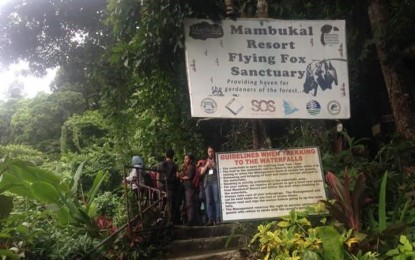
TO THE BAT SANCTUARY. The entrance to the Mambukal Resort Flying Fox Sanctuary in Murcia, Negros Occidental. (Photo courtesy of Errol A. Gatumbato)
BACOLOD CITY -- The Department of Environment and Natural Resources (DENR) is set to develop a management plan for the conservation of bats in the Philippines.
Anson Tagtag, chief of the DENR-Biodiversity Management Bureau, Wildlife Management Section, said bat conservation, involving the flying fox species in particular, is “very much part of the policy agenda” of the biodiversity conservation development efforts of the agency.
The Philippines has 79 bat species, 38 of which are endemic.
Tagtag discussed the country’s own initiatives during the four-day 4th International Southeast Asian Bat Conference held in this city until Thursday.
On the conference’s last day, the DENR-Biodiversity Management Bureau conducted the Philippine Flying Fox Action Plan-Consultation Workshop.
“We are going to develop a management plan so that we will be guided on what types of activities to be undertaken. We will be able measure how we progress throughout the years, and we will see and connect how bat conservation will contribute to human well-being,” Tagtag said.
Given the bat conservation efforts in the country, he pointed out the essential role of the flying fox in reforestation and eco-tourism promotion.
“When we talk about National Greening Program, this is what triggers the discussion on flying fox. They have a role in the natural seeding process. We can reduce costs on reforestation if we have these natural agents,” Tagtag said.
Bats, whose natural habitats are forests and caves, play an important role in biodiversity, specifically in pollination and pest control.
“When we talk about eco-tourism, bats are also mentioned because they are potential part of recreation. They should be appreciated. The visit to see bats in caves is an amazing site. It should be promoted for tourism,” he said.
Tagtag also said on Boracay Island, the conservation of forests is assisted by flying foxes.
“We have a proposal for a critical habitat for flying fox in Boracay,” he said.
Tagtag’s works on bat conservation include research studies on the molecular evidence of Ebola virus infection in Philippine bats and behavior of the endangered golden-crowned flying fox.
He was also instrumental in creating the Regional Flying Fox Monitoring Team. (PNA)
